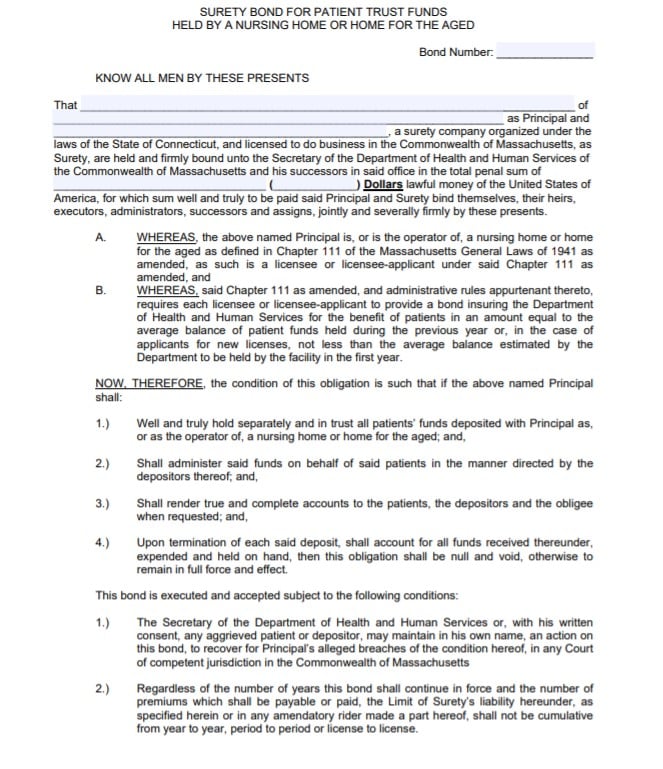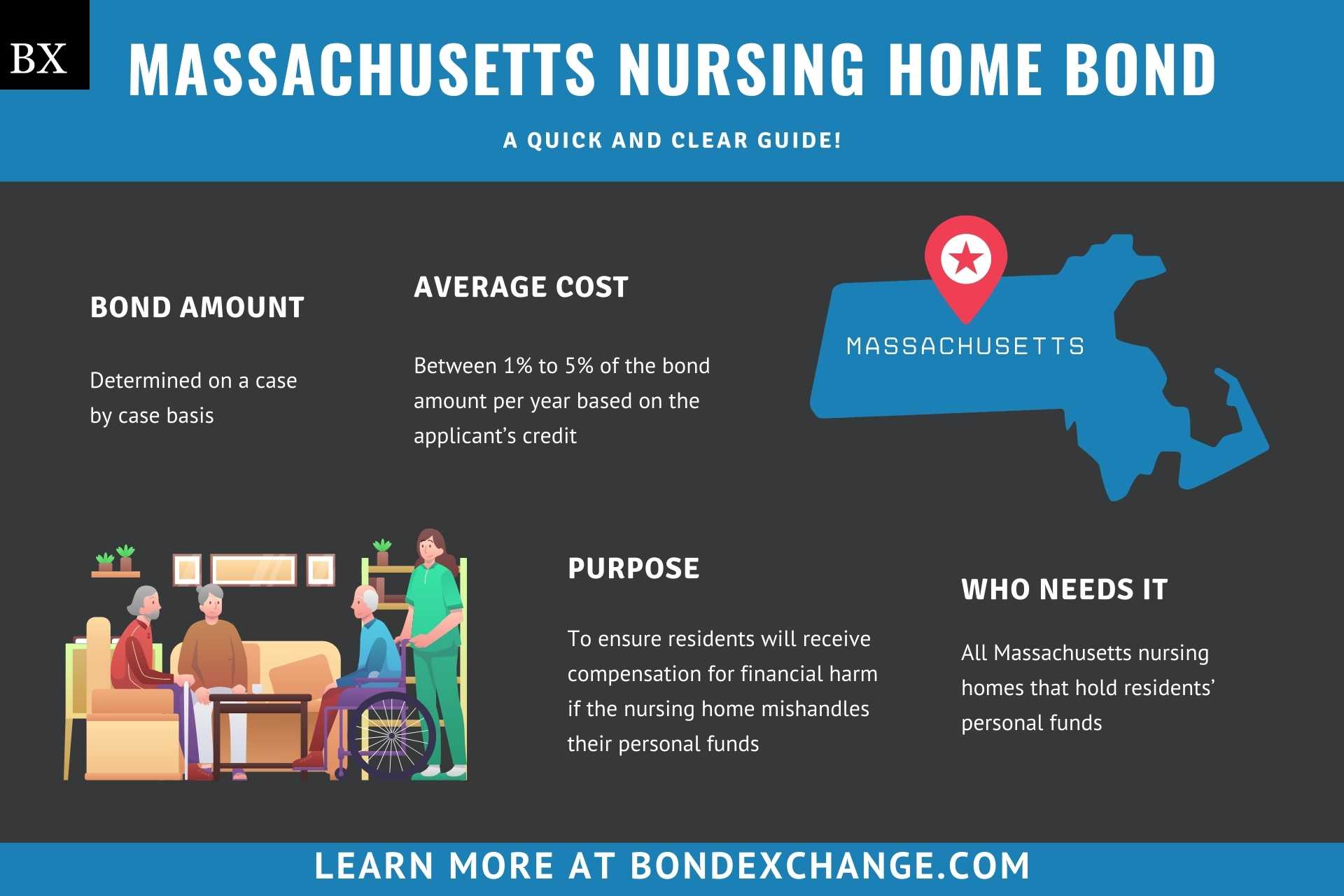Massachusetts Nursing Home Bond: A Comprehensive Guide
This guide provides information for insurance agents to help their customers obtain a Massachusetts Nursing Home bond
At a Glance:
- Lowest Cost: 1% of the bond amount per year based on the applicant’s credit
- Bond Amount: Determined on a case by case basis (more on this later)
- Who Needs it: All Massachusetts nursing homes that hold residents’ personal funds
- Purpose: To ensure residents will receive compensation for financial harm if the nursing home mishandles their personal funds
- Who Regulates Nursing Homes in Massachusetts: The Massachusetts Department of Health and Human Services

Background
Massachusetts statute 16-111-71 requires all nursing homes operating in the state to obtain a license with the Department of Health and Human Services. The Massachusetts legislature enacted the licensing laws and regulations to ensure that nursing homes engage in ethical business practices. To provide financial security for the enforcement of the licensing law, nursing homes that hold residents’ personal funds must purchase and maintain a surety bond, to be eligible for licensure. Additionally, federal statute 483.10 requires all long-term care facilities that hold resident funds in a trust account to purchase a surety bond or other similar form of security. However, the federal regulation leaves the implementation and enforcement of this requirement to individual states.
What is the Purpose of the Massachusetts Nursing Home Bond?
Massachusetts requires nursing homes that hold resident funds to purchase a surety bond as part of the application process to obtain a business license. The bond ensures that residents will receive compensation for financial harm if the nursing home fails to abide by the regulations set forth in Massachusetts statute 16-111. Specifically, the bond protects residents if the nursing home in any way mismanages their personal funds. In short, the bond is a type of insurance that protects residents if the nursing home acts unethically with their money.
How Can an Insurance Agent Obtain a Massachusetts Nursing Home Surety Bond?
BondExchange makes obtaining a Massachusetts Nursing Home surety bond easy. Simply log in to your account and use our keyword search to find the “nursing home” bond in our database. Don’t have a login? Gain access now and let us help you satisfy your customers’ needs. Our friendly underwriting staff is available by phone at (800) 438-1162, email, or chat from 7:30 AM to 7:00 PM EST to assist you.
At BondExchange, our 40 years of experience, leading technology, and access to markets ensures that we have the knowledge and resources to provide your clients with fast and friendly service whether obtaining quotes or issuing bonds.
Not an agent? Then let us pair you with one!
Click the above image to find a BX Agent near you
How is the Bond Amount Determined?
The bond amount must be equal to the average balance of resident funds held during the previous year. First-time license applicants may use the estimated average balance to be held within the one-year period after the bond is issued.
Is a Credit Check Required for the Massachusetts Nursing Home Bond?
Surety companies will run a credit check on the owners of the nursing home to determine eligibility and pricing for the Massachusetts Nursing Home bond. Owners with excellent credit and work experience can expect to receive the best rates. Owners with poor credit may be declined by some surety companies or pay higher rates. The credit check is a “soft hit”, meaning that the credit check will not affect the owner’s credit.
How Much Does the Massachusetts Nursing Home Bond Cost?
The Massachusetts Nursing Home bond can cost anywhere between 1% to 5% of the bond amount per year. Insurance companies determine the rate based on a number of factors including your customer’s credit score and experience. The chart below offers a quick reference for the bond cost on a $10,000 bond requirement.
$10,000 Nursing Home Bond Cost
| Credit Score | Bond Cost (1 year) | Bond Cost (1 month) |
|---|---|---|
| 625+ | $100 | $10 |
| 600 – 624 | $250 | $25 |
| 575 – 599 | $300 | $30 |
| 500 – 574 | $500 | $50 |
*The credit score ranges do not include other factors that may result in a change to the annual premium offered to your customers, including but not limited to, years of experience and underlying credit factors contained within the business owner’s credit report.
Who is Required to Purchase the Bond?
All Massachusetts nursing homes that hold residents’ personal funds must purchase and maintain a surety bond as a prerequisite for licensure. Massachusetts defines a nursing home as an institution that houses 4 or more individuals and provides them with long-term nursing care.

BondExchange now offers monthly pay-as-you-go subscriptions for surety bonds. Your customers are able to purchase their bonds on a monthly basis and cancel them anytime. Learn more here.
How Do Nursing Homes Apply for a License in Massachusetts?
Nursing homes in Massachusetts must navigate several steps to secure their license. Below are the general guidelines, but applicants should refer to the application form for details on the process.
License Period – All Massachusetts Nursing Home Licenses are valid for two-year terms and must be renewed before the expiration date
Step 1 – Apply for a Determination of Need
Prior to obtaining a license, nursing homes must first apply for a determination of need and have their application approved Determination of Need Program. To apply, nursing homes should email their completed application, including all required fees and documentation, to [email protected]. Nursing homes should reference the application instructions for help navigating the application process.
Step 2 – Complete the Plan Review Process
Applicants constructing new facilities or renovating existing ones must complete the plan review process prior to applying for licensure
Step 3 – Pass Inspection
Massachusetts requires nursing homes to pass an inspection conducted by the applicant’s local fire department. Applicants must submit their inspection certificate with their license application.
Step 4 – Purchase a Surety Bond
Nursing homes that hold residents’ personal funds must purchase and maintain a surety bond
Step 5 – Apply for Licensure
All Massachusetts Nursing Home License applications must be mailed to the following address:
Licensure Coordinator
DPH, Division of Health Care Facility Licensure and Certification
67 Forest Street
Marlborough, MA 01752
Nursing homes must complete the application in its entirety and pay the required application fee. Applicants must submit a CORI form, authorizing the Massachusetts Division of Health Care Facility Licensure and Certificate to conduct a background check, for each company owner/officer. Additionally, nursing homes whose initial application indicates that additional information is required must submit a suitability application disclosure form. The nursing home will be notified if they must complete this form after their application has been reviewed.
How Do Massachusetts Nursing Homes Renew Their License?
Prior to their license expiration date, nursing homes in Massachusetts will be sent instructions on how to renew their license. All Massachusetts Nursing Home Licenses are valid for two-year terms must be renewed before the expiration date.
What are the Insurance Requirements for Nursing Homes in Massachusetts?
Massachusetts does not require nursing homes to obtain any form of liability insurance as a prerequisite to obtaining a business license. Nursing homes that hold residents’ personal funds must purchase and maintain a surety bond in an amount equal to the average balance of resident funds held during the previous year. First-time license applicants may use the estimated average balance to be held within the one-year period after the bond is issued.
How Do Massachusetts Nursing Homes File Their Bond?
Nursing homes should mail their completed bond form, including the power of attorney, to the following address:
Licensure Coordinator
DPH, Division of Health Care Facility Licensure and Certification
67 Forest Street
Marlborough, MA 01752
The surety bond requires signatures from both the surety company that issues the bond and from a representative of the nursing home. The surety company should include the following information on the bond form:
- Legal name and address of entity/individual(s) buying the bond
- Surety company’s name
- Bond amount
- Date the bond goes into effect
- Date the bond is signed
What Can Massachusetts Nursing Homes Do to Avoid Claims Against Their Bond?
To avoid claims on their bond, nursing homes in Massachusetts must ensure that they:
- Hold all resident funds in a designated trust account
- Shall administer the funds according to the wishes of the residents or their representatives
- Accurately report on all resident funds
- Do not in any way mishandle resident funds
- Refund all remaining funds when upon the termination of an account
What Other Insurance Products Can Agents Offer Nursing Homes in Massachusetts?
Massachusetts does not require nursing homes to purchase any form of liability insurance as a prerequisite to obtaining a business license. However, most reputable businesses will seek to obtain this insurance anyway. Bonds are our only business at BondExchange, so we do not issue any other types of insurance, but our agents often utilize brokers for this specific line of business. A list of brokers in this space can be found here.
How Can Insurance Agents Prospect for Massachusetts Nursing Home Customers?
Massachusetts conveniently provides a public database to search for active nursing homes in the state. The database can be accessed here. Contact BondExchange for additional marketing resources. Agents can also leverage our print-mail relationships for discounted mailing services.

